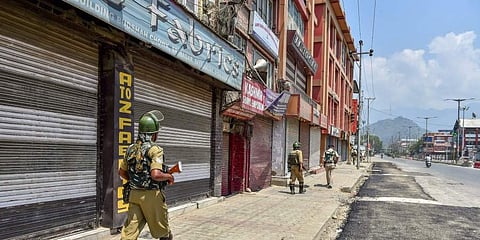

On August 4, law graduate Aleem Syed Mohammad called up his parents in Anantnag to ask if they had stocked up on supplies and were safe. He was worried since the army troops in the region had doubled and nobody really knew what was happening. Aleem told them that he feared some sort of trouble is brewing but his parents assured him that they were only rumours. Then the call got disconnected. That's the last he heard from them, "They were not prepared...not ready."
On August 28, 22 days after the government of India abrogated Article 370 in Jammu and Kashmir, the Supreme Court has given Aleem the 'permission slip' to visit home and see if his parents and relatives are alive and well. He will leave for Kashmir tomorrow — August 29. He has no idea of what awaits him but he's eager to get home.
Aleem graduated from the Jamia Millia Islamia earlier this year and is currently pursuing his apprenticeship at a firm in Delhi. After watching him worried and stressed out about the condition of his family in Anantnag, his seniors encouraged him to use what he knew best to find a way home — law. "With the help of my seniors, I was able to file a petition in the Supreme Court. I've spent so many years studying the law and I know my rights and the remedies available, so I thought to myself that I should exercise my rights and filed the petition," Aleem said.
In his petition, Aleem said that there had been 53 instances of communication blackout in the area just this year and although it was common, the complete communication blackout was illegal. "The information blackout and the restrictions in movement violate the fundamental rights to freedom and movement under Article 19," he stated in his petition.
On August 10, Aleem filed the petition directly at the Supreme Court as he had no access to the High Courts of Jammu and Kashmir. In his petition, Aleem said, "The petitioner further submits that no ground exists for keeping his parents and entire Kashmir valley under detention and even the United Nations Special Rapporteur on freedom of expression, David Kaye, has stated that this draconian shutdown in Kashmir valley is unprecedented. The petitioner humbly submits that even though there has been communication blackout in Kashmir in past, he cannot recall when a blackout of this level where even landline and TV has been rendered useless ever happened in Kashmir valley. The petitioner submits that such a blockade is in violation of Article 21 of the petitioner, his family members and the rest of Kashmir."
"The last thing I heard my parents say was that they thought the whole thing was a rumour. They were not prepared, they were not ready for what happened. These shutdowns are common but not even landlines are available, this was completely unprecedented," Aleem said. When we asked him if he had any hope at all about the judgment going his way even when top political leaders were getting turned away, Aleem said he did, "Otherwise I would not even have filed the petition. I was hopeful that something might come of it."
When asked what his immediate reaction was to the judgment, Aleem said, "Relief!". The law graduate said he completely respected the judgment, "I respect the order and in all this conundrum, this became a sliver of hope for me." The judges have also said that Aleem has to come back and file a report on the situation at home, "I have to report on my family situation primarily and any other problems concerned but I don't know. I'll have to see what I find there." He is skeptical about the situation but for now, just wants to prepare for his trip.
We asked Aleem if he thinks more Kashmiri students should approach the Supreme Court like he did and find a way to go back to their families, "Yes, if they can, they should."
